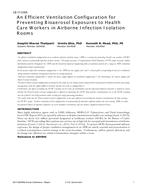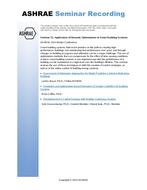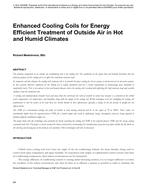An HVAC duct system was designed using the dynamic programming method (DPM), which considered system pressure equilibrium and the least life-cycle cost to derive the duct size and fan capacity. A simple example was provided to understand the characteristics of DPM and compare with the conventional duct design methods. Since DPM contains the concept of minimizing the life-cycle cost, the design results not only guarantee each path to share the same pressure but also bear a smaller cost than other methods. The limit on duct diameter or flow velocity was added to the computation process. As a result, the derived outcome satisfied all the requirements of duct diameter or flow velocity. In particular, the computation needed in DPM is simpler than most methods that consider the least life-cycle cost, making DPM a successful method for duct system design.
Units: SI
Citation: ASHRAE Transactions, vol. 108, pt. 1, Atlantic City, 2002
Product Details
- Published:
- 2002
- Number of Pages:
- 10
- File Size:
- 1 file , 200 KB
- Product Code(s):
- D-6948


